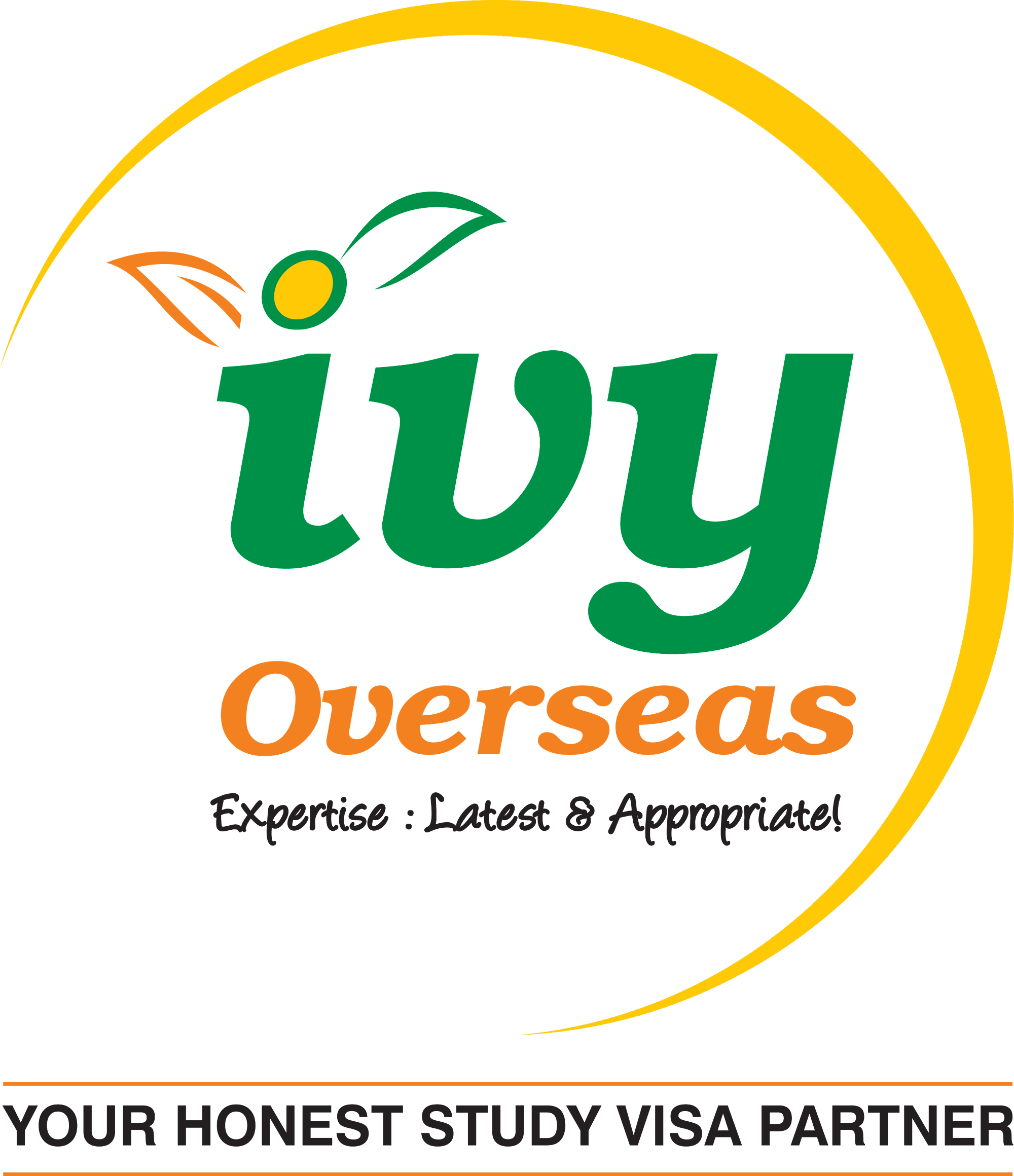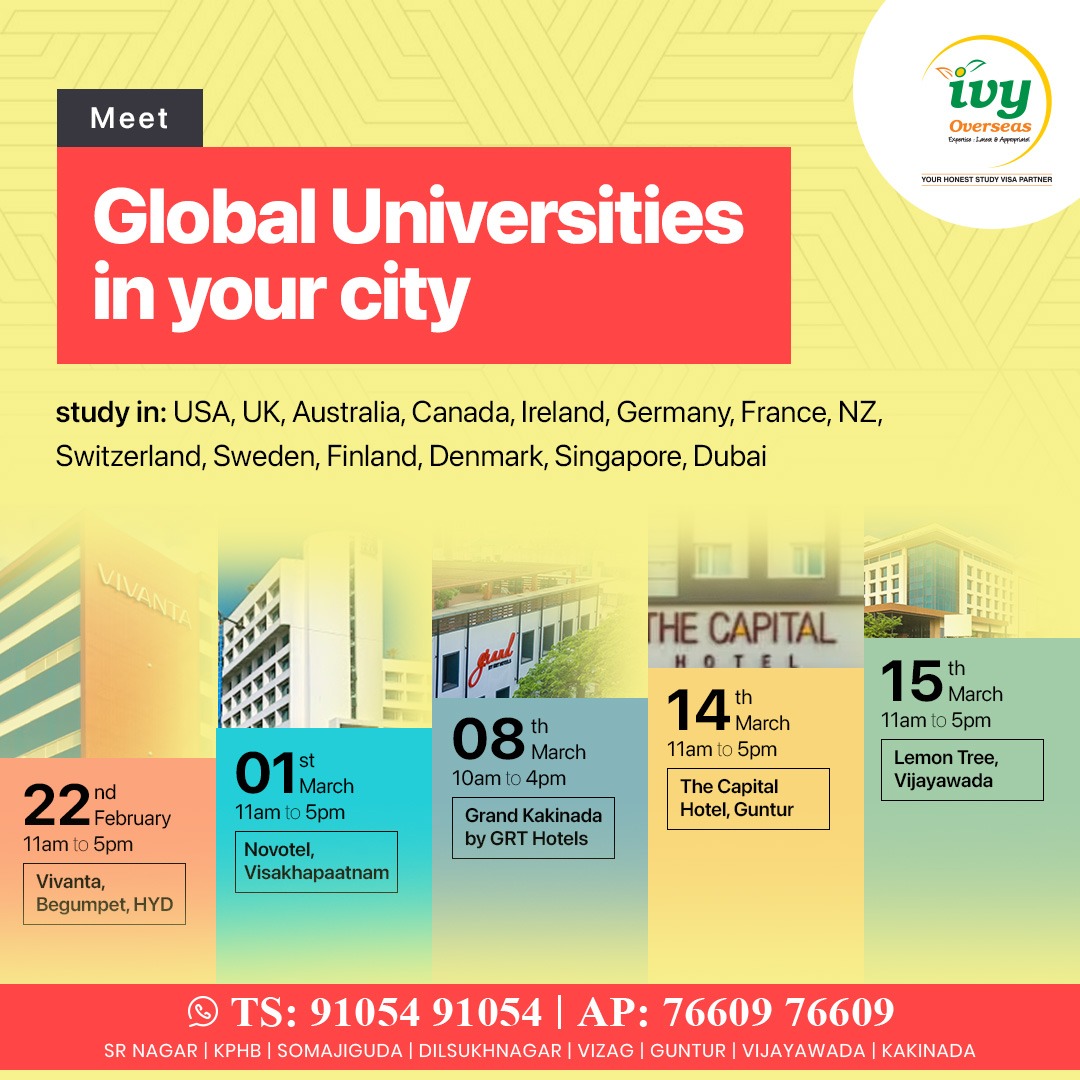Study in Canada consultants in Hyderabad and Andhra Pradesh
IVY Overseas is the Best Study in Canada consultants in Hyderabad and Andhra Pradesh. Canada is one of the most preferred destinations for international students due to its top-ranked universities, high standard of living, post-study work opportunities, and multicultural environment. With a globally recognized education system and affordable tuition fees compared to other Western countries, Canada continues to attract thousands of students from around the world every year.
Canada ranks highly globally in terms of quality of life. This includes a stable and peaceful society, low crime rates, and a clean environment. Canadian cities, such as Vancouver, Toronto, and Montreal, consistently rank among the best places to live in the world. They offer a vibrant cultural scene, beautiful natural landscapes, and a friendly, welcoming environment.
Why Study in Canada?
Canada is known for its globally recognized universities, affordable education, and welcoming atmosphere for international students. With its diverse culture and ample post-study work opportunities, Canada is a perfect destination for students aiming to get a world-class education while enjoying a great quality of life. Let’s explore the key benefits of studying in Canada.
- World-Class Education: Top-ranked universities like University of Toronto and McGill University.
- Affordable Tuition: Tuition fees range from CAD 7,000 to CAD 29,000, lower than other top countries.
- Cultural Diversity: Students from over 200 countries, offering a global networking experience.
- Post-Graduation Work Permit: Work in Canada for up to 3 years after graduation.
- Safe Environment: Canada is one of the safest countries in the world.
- Work While Studying: 20 hours per week during semesters and full-time during breaks.
- Pathway to Permanent Residency: Opportunities for permanent residency through Express Entry.
- High Quality of Life: Affordable living in cities like Montreal and Quebec, ranked high in global quality of life.
- Strong Job Market: Canada has a growing job market for international graduates.
- Universal Healthcare: Affordable healthcare services for students in most provinces.
Study in Canada : Facts about Canada
With globally recognized degrees and a welcoming, multicultural society, Canada is the perfect place to pursue your academic and career aspirations. Join thousands of international students who have chosen Canada to build their future!
| Category | Details |
|---|---|
| Capital | Ottawa |
| Largest City | Toronto |
| Population | Over 38 million people (2023 estimate) |
| Global Ranking | Canada is ranked 2nd globally for quality of life (Mercer 2021). |
| Safe Country | Consistently ranks among the safest countries in the world for students. |
| Multicultural Society | Over 200 languages spoken and a welcoming environment for international students. |
| Natural Beauty | Known for stunning landscapes including the Rocky Mountains, Niagara Falls, and pristine lakes. |
| Strong | One of the world’s wealthiest countries with opportunities in various sectors like tech, finance, healthcare, and engineering. |
Study in Canada : Education System
In Canada, the education system offers two primary pathways for higher education: universities and community colleges. Both play distinct roles and cater to different educational and career aspirations.
-
1. Universities:
- Universities in Canada offer undergraduate (Bachelors), graduate (Master’s), and doctoral programs (Ph.D.).
- They are research-focused institutions known for offering a wide range of academic disciplines.
- Admission is competitive, and programs typically take 3-4 years for undergraduate studies, 1-2 years for Master's, and 4-6 years for Ph.D. programs.
- Examples: University of Toronto, McGill University, University of British Columbia (UBC), University of Alberta.
- Colleges provide diploma, certificate, and applied degree programs, often in technical, trades, or vocational fields.
- These programs are more career-oriented and provide hands-on skills that prepare students directly for the workforce.
- Examples: George Brown College, Sheridan College, Humber College.
- Polytechnics are similar to colleges but focus on applied education and offer more specialized programs in areas like engineering, technology, health, and business.
- Examples: British Columbia Institute of Technology (BCIT), Seneca College.
-
2.Colleges:
-
3.Polytechnic Institutions:
| Program Level | Duration | Fields of Study | Admission Requirements | Tuition Fees (per year) | Top Institutions |
|---|---|---|---|---|---|
| Undergraduate (UG) | 3-4 years | Engineering, Business, Arts, Science | 12th grade, IELTS/TOEFL, transcripts | CAD 7,000 – 29,000 | University of Toronto, UBC, McGill |
| Postgraduate (PG) | 1-2 years | Computer Science, Management, Health | Bachelor’s degree, IELTS, SOP, LORs | CAD 13,000 25,000 | McGill, Waterloo, Queen's |
| Postgraduate Diploma | 1-2 years | IT, Business, Hospitality, Design | UG degree, IELTS, some work experience | CAD 10,000 – 18,000 | Seneca, George Brown, Centennial |
Cost of Study in Canada
Canada offers quality education at competitive prices compared to other popular destinations like the USA or UK, making it one of the best options for Indian students seeking a globally recognized degree. The cost of study in Canada varies depending on the level of education, course, and institution you choose. On average, international students can expect to pay between CAD 7,000 and CAD 35,000 per year. Bachelors programs are generally more affordable, while Master’s and specialized courses can cost slightly higher.
- Cost of Study in Canada for Masters: Planning to pursue a master's in Canada? The cost of study in Canada for masters typically ranges from CAD 13,000 to CAD 35,000 per year depending on the program and university. Canadian universities offer world-class education, research facilities, and excellent post-study work opportunities, making your investment worthwhile.
- Cost of Study in Canada for Bachelors: The cost of study in Canada for bachelors programs is quite affordable when compared to other English-speaking countries. On average, tuition fees for undergraduate courses range between CAD 7,000 and CAD 29,000 per year, depending on the course and institution.
- Cost of Study in Canada for PG Diploma: Looking for a cost-effective option? The cost of study in Canada for PG diploma programs is generally between CAD 10,000 and CAD 18,000 per year. These programs offer great value and are highly preferred by international students due to practical curriculum and easy admission requirements.
Scholarships for Study in Canada
Looking to reduce the cost of your international education? A scholarship in Canada can help you pursue your dream degree with financial support. Canadian universities, the government, and private organizations offer a wide range of scholarships for international students at undergraduate, postgraduate, and diploma levels. These scholarships are usually based on academic performance, leadership potential, or community involvement, and can cover tuition fees, living expenses, or both. Whether you're applying for a bachelor's, master's, or PG diploma program, Canada has multiple funding opportunities to support your education journey.
- Scholarships for Masters in Canada : Canada offers a wide range of scholarships for masters in Canada to help international students reduce their financial burden. These scholarships are provided by universities, the Canadian government, and private organizations. Most are merit-based and can cover partial or full tuition fees, living expenses, or research grants.
- Scholarships for Bachelors in Canada: Many Canadian institutions provide scholarships for bachelors in Canada to attract talented international students. These scholarships are awarded based on academic excellence, leadership qualities, and extracurricular achievements. They range from CAD 2,000 to CAD 20,000 depending on the university and student profile.
- Scholarships for PG Diploma in Canada: While PG Diploma programs are generally more affordable, some institutions offer scholarships for PG Diploma in Canada for deserving candidates. These scholarships may include tuition discounts, entrance awards, or performance-based incentives.
Requirements to Study in Canada
Understanding the admission requirements to study in Canada is the first step toward securing a place at a Canadian university or college. Each level of studywhether it's a bachelors, master’s, or PG diploma programhas specific academic, language, and document criteria that international students must meet. Here's a quick guide to help you understand the eligibility and prepare accordingly.
| Program | Academic Requirements | English Language Test | Other Requirements |
|---|---|---|---|
| Bachelors | Minimum 12th grade with 65%80% (depending on course) | IELTS 6.0 (no band less than 5.5) or TOEFL 80 | Statement of Purpose (SOP), LORs, Passport, Resume |
| Master’s | 4-year UG degree with 70%+ or equivalent CGPA | IELTS 6.5–7.0 or TOEFL 90–100 | SOP, LORs, Resume, Academic Transcripts, Passport |
| PG Diploma | 3 or 4-year UG degree with 55%–65% | IELTS 6.0 (no band less than 6.0) or TOEFL 80 | Resume, SOP, Passport, Transcripts, Work Experience (if needed) |
Canada Study Visa: SDS and Non-SDS Explained
When applying for a Canada Study Visa, international students typically go through one of two main streams: SDS (Student Direct Stream) and Non-SDS. Understanding the difference between these two visa pathways is essential to ensure a smooth application process. The SDS route offers faster processing for eligible students from specific countries, while Non-SDS is available to students from all countries with standard processing times. Knowing which category you fall into can help you plan your documents, finances, and timelines better.
| Criteria | SDS (Student Direct Stream) | Non-SDS |
|---|---|---|
| Eligibility | Citizens of select countries (e.g., India, China, Vietnam, Philippines) | All international students regardless of nationality |
| Processing Time | Fast (Approx. 20 calendar days) | Standard (Varies, often 68 weeks) |
| English Language Requirement | IELTS score of 6.0 in each band (Academic) | IELTS/TOEFL/Duolingo (varies by college/university) |
| Tuition Fee Payment | Full 1 year tuition fee paid in advance | Partial or full fee accepted (depending on institution) |
| GIC Requirement | Mandatory CAD 10,000 GIC | Optional or bank statement required |
| Documents | Fewer documents (streamlined) | More documents required (SOP, bank statements, etc.) |
Part-Time Work and Post-Study Work in Canada
Canada offers great opportunities for international students to work while studying and after graduation. During your studies, you can work part-time (up to 20 hours per week) and full-time during scheduled breaks, allowing you to gain valuable experience and support your living expenses. After completing your program, you can apply for a Post-Graduation Work Permit (PGWP), which allows you to work in Canada for up to three years, gaining full-time experience in your field.
These work opportunities not only help with your finances but also enhance your career prospects, especially as Canadian work experience is a key factor in applying for permanent residency.
Part-Time Work in Canada for International Students
International students in Canada are allowed to work part-time during their studies. Understanding the part-time work rules in Canada for international students helps you manage your expenses and gain valuable experience.
- Work up to 20 hours/week during academic sessions.
- Full-time work allowed during scheduled breaks.
- No separate permit your study permit covers work eligibility.
- Earn approximately CAD 13–20/hour.
- Popular roles: cashier, delivery, customer support, assistant jobs, etc.
Post-Study Work in Canada (PGWP)
After completing your studies, international students can apply for a Post-Graduation Work Permit (PGWP) in Canada. The post-study work visa in Canada allows you to gain Canadian work experience and is a great step toward PR.
- PGWP valid up to 3 years depending on course length.
- Applies to students from Designated Learning Institutions (DLIs).
- No job offer required to apply.
- Open work permit – any field, any employer.
- Helps with Canadian Experience Class (CEC) PR pathway.
Study in Canada with IVY Overseas
Are you ready to take the next step in your education and career? Canada offers world-class education, a high quality of life, and excellent work opportunities for international students. At IVY Overseas, we specialize in guiding students through the entire process—from choosing the right program and university to securing a student visa and exploring work options.
Frequently Asked Questions
Get in touch with IVY Overseas today to kickstart your study in Canada! Our team is here to help you every step of the way—from application to settlement.


